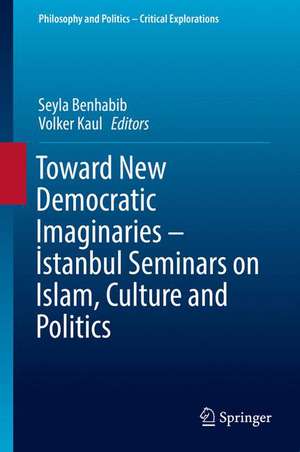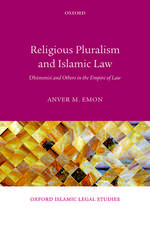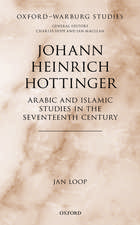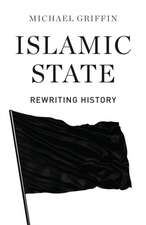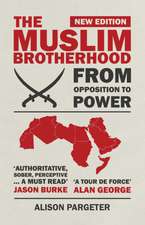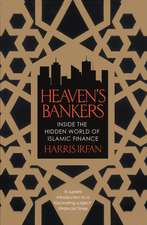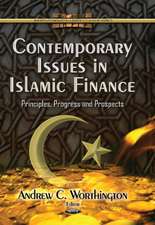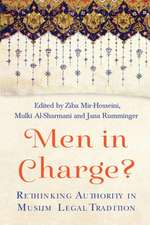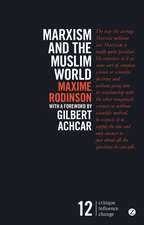Toward New Democratic Imaginaries - İstanbul Seminars on Islam, Culture and Politics: Philosophy and Politics - Critical Explorations, cartea 2
Editat de Seyla Benhabib, Volker Kaulen Limba Engleză Hardback – 27 sep 2016
The authors analyze struggles over political legitimacy since the Arab Spring and the rise of Al Qaeda and ISIS in their historical and political complexity across the MENA (Middle East and North Africa) region. Distinguishing multiculturalism from interculturalism and understanding multiple modernities, philosophers in the volume tease out the complexities of civilizational encounters. The volume also shows how the Paris massacres or the Danish caricature controversy do not remain confined to Europe but influence struggles and confrontations within Muslim societies. Gender and Islam are addressed from a comparative perspective bringing into conversation not only the experience of different Muslim countries with Islamic law but also by analysing Jewish family law.
Din seria Philosophy and Politics - Critical Explorations
-
 Preț: 226.46 lei
Preț: 226.46 lei - 20%
 Preț: 567.64 lei
Preț: 567.64 lei - 24%
 Preț: 633.28 lei
Preț: 633.28 lei -
 Preț: 394.29 lei
Preț: 394.29 lei - 15%
 Preț: 635.12 lei
Preț: 635.12 lei -
 Preț: 381.43 lei
Preț: 381.43 lei - 15%
 Preț: 580.17 lei
Preț: 580.17 lei -
 Preț: 384.31 lei
Preț: 384.31 lei - 18%
 Preț: 900.49 lei
Preț: 900.49 lei - 18%
 Preț: 725.92 lei
Preț: 725.92 lei - 15%
 Preț: 466.95 lei
Preț: 466.95 lei - 18%
 Preț: 728.43 lei
Preț: 728.43 lei - 15%
 Preț: 634.68 lei
Preț: 634.68 lei - 15%
 Preț: 690.76 lei
Preț: 690.76 lei - 18%
 Preț: 723.06 lei
Preț: 723.06 lei - 18%
 Preț: 721.51 lei
Preț: 721.51 lei - 18%
 Preț: 726.55 lei
Preț: 726.55 lei -
 Preț: 369.56 lei
Preț: 369.56 lei - 18%
 Preț: 895.76 lei
Preț: 895.76 lei - 15%
 Preț: 696.35 lei
Preț: 696.35 lei - 15%
 Preț: 701.90 lei
Preț: 701.90 lei - 15%
 Preț: 642.83 lei
Preț: 642.83 lei - 15%
 Preț: 648.24 lei
Preț: 648.24 lei - 20%
 Preț: 566.52 lei
Preț: 566.52 lei - 15%
 Preț: 585.73 lei
Preț: 585.73 lei - 15%
 Preț: 642.18 lei
Preț: 642.18 lei - 18%
 Preț: 731.73 lei
Preț: 731.73 lei -
 Preț: 390.25 lei
Preț: 390.25 lei
Preț: 707.78 lei
Preț vechi: 832.68 lei
-15% Nou
Puncte Express: 1062
Preț estimativ în valută:
135.48€ • 147.21$ • 113.87£
135.48€ • 147.21$ • 113.87£
Carte tipărită la comandă
Livrare economică 21 aprilie-05 mai
Preluare comenzi: 021 569.72.76
Specificații
ISBN-13: 9783319418193
ISBN-10: 331941819X
Pagini: 385
Ilustrații: XLVIII, 342 p. 4 illus.
Dimensiuni: 155 x 235 x 22 mm
Greutate: 0.72 kg
Ediția:1st ed. 2016
Editura: Springer International Publishing
Colecția Springer
Seria Philosophy and Politics - Critical Explorations
Locul publicării:Cham, Switzerland
ISBN-10: 331941819X
Pagini: 385
Ilustrații: XLVIII, 342 p. 4 illus.
Dimensiuni: 155 x 235 x 22 mm
Greutate: 0.72 kg
Ediția:1st ed. 2016
Editura: Springer International Publishing
Colecția Springer
Seria Philosophy and Politics - Critical Explorations
Locul publicării:Cham, Switzerland
Cuprins
Preface; Giancarlo Bosetti.- Acknowledgements; Giancarlo Bosetti.- Introduction: “Toward New Democratic Imaginaries. Istanbul Seminars on Islam, Culture and Politics”; Seyla Benhabib.- Part 1. Struggles Over Political Legitimacy: The Arab Spring; Al-Qaeda, and Gezi Park.- Foreword: “Contemporary Conflicts, Islam and Political Legitimacy”; Volker Kaul.- “The Public Visibility of Islam and the European Politics of Resentment. The Minaret-Mosques Debate” ; Nilüfer Göle.- “Creative Destruction’: States, Identities and Legitimacy in the Arab World”; Lisa Anderson.- “After the Arab Spring”; Michael Walzer.- “Politics After Al-Qaeda”; Faisal Devji.- “Genie in the Bottle: Gezi Park, Taksim Square, and the Realignment of Democracy and Space in Turkey”; İlay Romain Örs.- “All Quiet on the Kemalist Front?” ; Murat Borovalı and Cemil Boyraz.- “Rethinking the ‘Kurdish Question’ in Turkey: Modernity, Citizenship and Democracy”; Fuat Keyman.- Part 2. Islam and Democracy in the Global Age.- Foreword: “Sources of Democracy in Islam”; Volker Kaul.- “The ‘Others’ in the Qur’an: A Hermeneutical Approach”; Nasr Abou Zayd.- “The Epistemology of Truth in Modern Islam”; Khaled Abou El Fadl.- “Democracy and Islam”; Irfan Ahmad.- “Islam: the Test of Globalization”; Abdelmajid Charfi.- “Whither Democracy? Religion, Politics and Islam”; Fred Dallmayr.- “Rethinking Religion and Political Legitimacy Across the Islam-West Divide”; Nader Hashemi.- “Islam and the West: Conflict, Democracy, Identity”; Akeel Bilgrami.- Part 3. Multiculturalism, Interculturalism and Multiple Modernities.- Foreword: “Political Models Accommodating Pluralism”; Volker Kaul.- “Interculturalism or Multiculturalism?”; Charles Taylor.- “Misunderstanding Cultures: Islam and the West,”; Kwame Anthony Appiah.- “Many Cultures, one Citizenship”; Alain Touraine.- “The Constant Mediation of Resentment and Retalitation”; Abdullahi Ahmed An-Na’im.- “The Specter Haunting Multiculturalism”; Richard J. Bernstein.- “Reflexive Pluralism”; Alessandro Ferrara.- “The Emerging Domain of the Political”; David Rasmussen.- Part 4. Gender, Culture and Islam.- Foreword: “Gender Equality and Multiculturalism”; Volker Kaul.- “Uncrossed Bridges: Islam, Feminism and Secular Democracy”; Asma Barlas.- “Women’s Problems as a ‘Women’s Only’ Problem? Debates on Gender and Democracy in Iran”; Katajun Amirpur.- “Women’s Rights in Muslim Societies: Lessons from the Moroccan Experience”; Nouzha Guessous.- “The Debate on Religion, Law and Gender in Post-Revolution Tunisia”; Amel Grami.- “Faith In Law? Diffusing Tensions Between Diversity and Equality”; Ayelet Shachar.- Index.
Notă biografică
Seyla Benhabib, born in Istanbul, Turkey, is the Eugene Meyer Professor of Political Science and Philosophy at Yale University and was Director of its Program in Ethics, Politics and Economics from 2002 to 2008. She was the President of the Eastern Division of the American Philosophical Association in 2006-07 and has been a member of the American Academy of Arts and Sciences since 1995. She has previously taught at the New School for Social Research and Harvard Universities, where shewas Professor of Government from 1993-2000 and Chair of Harvard’s Program on Social Studies from 1996-2000.
Professor Benhabib is the recipient of the Ernst Bloch prize for 2009, the Leopold Lucas Prize from the Theological Faculty of the University of Tubingen (2012), and the Meister Eckhart Prize (2014; one of Germany’s most prestigious philosophical prizes). A Guggenheim Fellowship recipient (2011-12), she has been research affiliate and senior scholar in many institutions in the US and in Europe such as Berlin’s Wissenschaftkolleg (2009), NYU’s Strauss Center for the Study of Law and Justice (2012) and the European University Institute in Florence (Summer 2015).
Her work has been translated into German, Spanish, French, Italian, Turkish, Swedish, Russian, Serbo-Croatian, Hebrew, Polish, Japanese and Chinese and she has also edited and coedited 10 volumes on topics ranging from democracy and difference to the rights of migrant women and children; the communicative ethics controversy and Hannah Arendt. Her volume, Migrations and Mobilities: Gender, Borders and Citizenship (NYU Press, 2009), edited with Judith Resnik from the Yale Law School, has been named by Choice one of the outstanding academic books ofthe year.
Her most recent books include: The Claims of Culture. Equality and Diversity in the Global Era, (2002); The Rights of Others. Aliens, Citizens and Residents (2004), winner of the Ralph Bunche award of the American Political Science Association (2005) and the North American Society for Social Philosophy award (2004); Another Cosmopolitanism: Hospitality, Sovereignty and Democratic Iterations, with responses by Jeremy Waldron, Bonnie Honig and Will Kymlicka (Oxford University Press, 2006); and Dignity in Adversity. Human Rights in Troubled Times< (UK and USA: Polity Press, 2011); Gleichheit und Differenz. Die Würde des Menschen und die Souveränitätsansprüche der Vőlker (bilingual edition in English and German: Mohr Siebeck, 2013).
Professor Benhabib holds Honorary Degrees from the Universities of Utrecht (2004), Valencia (2010) and Bogazici University in Istanbul (2012).
Volker Kaul is research fellow at the Center for Ethics and Global Politics at LUISS University in Rome. Moreover, he works as scientific coordinator of the Istanbul Seminars. He completed his PhD in political philosophy at LUISS University with a thesis on "Identity and Autonomy" and holds a double Master's degree in political and social sciences from Freie UniversitätBerlin and Sciences Po Paris. He was visiting fellow at the Department of Philosophy at Columbia University in 2006 and held a postdoc position at the University of Salerno from 2008 to 2012. His work focuses on the nature of identity conflicts. Together with David Rasmussen and Alessandro Ferrara he edited the special issues of Philosophy & Social Criticism on the Istanbul Seminars 2008-2015. He is currently editing together with Ingrid Salvatore a book on What is Pluralism? The Question of Pluralism in Politics for the publisher Routledge in its book series "Ethics, Human Rights and Global Political Thought".
Professor Benhabib is the recipient of the Ernst Bloch prize for 2009, the Leopold Lucas Prize from the Theological Faculty of the University of Tubingen (2012), and the Meister Eckhart Prize (2014; one of Germany’s most prestigious philosophical prizes). A Guggenheim Fellowship recipient (2011-12), she has been research affiliate and senior scholar in many institutions in the US and in Europe such as Berlin’s Wissenschaftkolleg (2009), NYU’s Strauss Center for the Study of Law and Justice (2012) and the European University Institute in Florence (Summer 2015).
Her work has been translated into German, Spanish, French, Italian, Turkish, Swedish, Russian, Serbo-Croatian, Hebrew, Polish, Japanese and Chinese and she has also edited and coedited 10 volumes on topics ranging from democracy and difference to the rights of migrant women and children; the communicative ethics controversy and Hannah Arendt. Her volume, Migrations and Mobilities: Gender, Borders and Citizenship (NYU Press, 2009), edited with Judith Resnik from the Yale Law School, has been named by Choice one of the outstanding academic books ofthe year.
Her most recent books include: The Claims of Culture. Equality and Diversity in the Global Era, (2002); The Rights of Others. Aliens, Citizens and Residents (2004), winner of the Ralph Bunche award of the American Political Science Association (2005) and the North American Society for Social Philosophy award (2004); Another Cosmopolitanism: Hospitality, Sovereignty and Democratic Iterations, with responses by Jeremy Waldron, Bonnie Honig and Will Kymlicka (Oxford University Press, 2006); and Dignity in Adversity. Human Rights in Troubled Times< (UK and USA: Polity Press, 2011); Gleichheit und Differenz. Die Würde des Menschen und die Souveränitätsansprüche der Vőlker (bilingual edition in English and German: Mohr Siebeck, 2013).
Professor Benhabib holds Honorary Degrees from the Universities of Utrecht (2004), Valencia (2010) and Bogazici University in Istanbul (2012).
Volker Kaul is research fellow at the Center for Ethics and Global Politics at LUISS University in Rome. Moreover, he works as scientific coordinator of the Istanbul Seminars. He completed his PhD in political philosophy at LUISS University with a thesis on "Identity and Autonomy" and holds a double Master's degree in political and social sciences from Freie UniversitätBerlin and Sciences Po Paris. He was visiting fellow at the Department of Philosophy at Columbia University in 2006 and held a postdoc position at the University of Salerno from 2008 to 2012. His work focuses on the nature of identity conflicts. Together with David Rasmussen and Alessandro Ferrara he edited the special issues of Philosophy & Social Criticism on the Istanbul Seminars 2008-2015. He is currently editing together with Ingrid Salvatore a book on What is Pluralism? The Question of Pluralism in Politics for the publisher Routledge in its book series "Ethics, Human Rights and Global Political Thought".
Textul de pe ultima copertă
This volume combines rigorous empirical and theoretical analyses with political engagement to look beyond reductive short-hands that ignore the historical evolution and varieties of Islamic doctrine and that deny the complexities of Muslim societies' encounters with modernity itself. Are Islam and democracy compatible? Can we shed the language of 'Islam vs. the West' for new political imaginaries?
The authors analyze struggles over political legitimacy since the Arab Spring and the rise of Al Qaeda and ISIS in their historical and political complexity across the MENA (Middle East and North Africa) region. Distinguishing multiculturalism from interculturalism and understanding multiple modernities, philosophers in the volume tease out the complexities of civilizational encounters. The volume also shows how the Paris massacres or the Danish caricature controversy do not remain confined to Europe but influence struggles and confrontations within Muslim societies. Genderand Islam are addressed from a comparative perspective bringing into conversation not only the experience of different Muslim countries with Islamic law but also by analysing Jewish family law.
The authors analyze struggles over political legitimacy since the Arab Spring and the rise of Al Qaeda and ISIS in their historical and political complexity across the MENA (Middle East and North Africa) region. Distinguishing multiculturalism from interculturalism and understanding multiple modernities, philosophers in the volume tease out the complexities of civilizational encounters. The volume also shows how the Paris massacres or the Danish caricature controversy do not remain confined to Europe but influence struggles and confrontations within Muslim societies. Genderand Islam are addressed from a comparative perspective bringing into conversation not only the experience of different Muslim countries with Islamic law but also by analysing Jewish family law.
Caracteristici
Offers highly topical interventions on the Arab Spring and its failure Turkey's Gezi park events and the Tunisian constitutional compromise Includes high-quality papers from a stellar cast of contemporary thinkers, intellectuals and activists from the MENA region Addresses Islam and democracy in the global era Throws much-needed light on gender, culture, religious difference in Islam as well as Judaism Provides philosophical reflection on hermeneutics and the Koran; the epistemology of truth in Islam; Islam and democracy Includes supplementary material: sn.pub/extras
